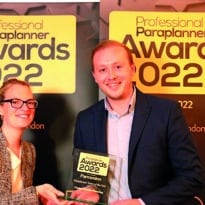Knowing from an early age she wanted to help people with their money, Farida Hassanali has focused on the exams and financial services roles that would enable her to follow her chosen path – and give back
Not many people know they want to be a paraplanner at the age of 12. Farida Hassanali, paraplanner with UBS Wealth Management, saw a television programme called ‘Your Money or Your Life’, presented by Alvin Hall, on helping people better engage with their money and from that point on knew that she wanted to do something that helped people in that way.
Following A-levels in maths, economics and psychology and a degree in maths and economics, she was already studying for the CF1 qualification when she landed the job of administrator at Churchouse Financial Planning (now Chapters Financial). The small Surrey-based business (consisting of Keith Churchouse, his wife and the administrator) was the ideal training ground for her career as a paraplanner, Farida says, simply because she was thrown in at the deep-end, learning enormous amounts as she went along and turning her hand to numerous elements of the role – “I was completing FCA (FSA at the time) returns by the end of three months” – including paraplanner duties.
Unfortunately, that was in 2007 and at the end of 2008, as Lehman Brothers collapsed and the financial services market went into meltdown, the small firm was unable to keep her role going and Farida was made redundant.
“But I was really lucky” she says. “I got another job almost straight away with Cumberland Place Financial Management in London.”
This was a client support role, working in a team of 15 people, including six financial advisers. During this time Farida passed her Diploma exams. In 2011 she moved to financial planning firm Truestone, in her first full-time role as a paraplanner.
In October 2014, Truestone was acquired by John Spier’s EQ Investors. Having spent four years with the company, Farida says she had “done everything I could and there weren’t any other positions I could move up into, so I felt it was time to leave.” In November 2015, she joined UBS Wealth Management.
“I felt UBS offered me a new challenge and being a larger company there are more options to move forward when I feel the time is right,” she says of the move, although admitting she had some feelings of trepidation in joining a far larger company. “There is always the fear that you become just a number. But the financial planning team is just 13 people, so what I’ve found is that you have the smaller company feel within the team with the support of the larger organisation.”
What is markedly different about the structure at UBS compared to the financial planning firms for which Farida has worked previously, is that as well as formalised and established manuals and procedures for most of the processes, the investment advice is dealt with separately from the financial planning. The financial planners only become involved with clients for non-investment advice, e.g. pensions, offshore bonds and protection. “It means we are focused on the financial planning, rather than get involved in the investments, so the client gets specialist advice on all sides,” Farida says.
Also, whereas at EQ Investors she worked within a pooled paraplanning team, working across all the advisers, at UBS each paraplanner works for a specific adviser.
The pooled and allocated adviser approaches have their own advantages, Farida says. “With an allocated approach you get to know your own financial planners better, but with pooled you can get a greater breadth of experience as you are dealing with a range of advisers, who may do things in different ways.”
Asked which she prefers, Farida opts for the allocated approach. “I like to have the greater control it offers. Also, you get more of a sense of the clients and the advisers and it is easier to prioritise the workloads because you can sit down and discuss cases with the adviser, which you can’t always do when you are working across all the advisers in the firm.”
Farida works with two financial planners and is supported by two administrators. The paraplanner is the central point, monitoring the workflow and keeping things on track.
“It’s different from what I have been used to but it works well,” she says.
Qualifications and knowledge
Having started on the financial planning exam path prior to having a job in financial services, it is not surprising to learn that Farida has attained the top qualifications from both the CII and CISI (IFP). She is a Fellow of the PFS, a Chartered and a Certified Financial Planner, an Accredited Paraplanner and has STEP and the Mortgage certificate from the CII, among other qualifications. She took the mortgage exam, she says, because she had little mortgage experience and felt it would be a good way to rapidly increase her knowledge and cut down the number of questions she was asking advisers when mortgage advice came up in factfinds.
“I think if you have any gaps then you need to fill them as soon as you can and taking the mortgage exam was an easy way for me to get up to speed in the subject.”
In addition, she has the IMC qualification under her belt. “I thought taking the IMC, which is a pure investment qualification, would be better training in the investment side of the business than taking the CII papers. A self-professed “love of maths” and the fact that she took economics at University, helped in doing the course and taking the exam, she says.
Having the IMC has come in useful over the past few years, not least during her time at EQ Investors, when she was involved in setting up the firm’s Positive Impact Portfolios. The portfolios, launched in 2012, invest in funds that can show they are supporting companies taking steps to achieve a social or environmental impact as well as a financial return.
“It was a great experience. I was involved in the research and analysis for the portfolios and the investment managers are great teachers too. And I loved that; I’m always curious and like learning and it gave me more experience and understanding, which I have used since then when analysing clients’ portfolios.”
Giving back
Philanthropy and giving back are important issues for Farida.
It was the fact that UBS Wealth management offers clients the means to be involved in philanthropy and social impact investing that drew her to the wealth manager, she says. “It means that clients have a lot more choice how they can gift or invest their money in social and environmentally conscious ways.”
Farida believes social impact investing is an area set for growth. “It’s a way not just of doing good but of diversifying a portfolio, so there is much more to attract people to them now. Performance is good too, these kinds of portfolios often did better during the Financial Crisis and recession than conventional investments, because of their reduced exposure to typical investment areas.”
Outside of work Farida is an Advanced First Aider volunteer with the St John’s Ambulance and takes part in a charity called GoodGym. “It’s a charity that is growing rapidly. The essential premise is that you meet up, run to a nearby location, help with a task or project, typically manual labour such as clearing an old person’s garden for them, or painting fences, and then you run back to the start point. It’s a good way to get exercise while doing good.”
What’s a typical day for Farida?
The first thing I do is look at the activity entries on the system to see what needs doing and I’ll check my emails to see what may have come in after I left work. I’m an organised person, so I tend to have my own ‘To Do’ list with my main priorities as well. I will go through and number them in priority order.
When I joined the company in November there was a lot of work to do and then we were straight into end-of-tax-year planning, but in terms of suitability report writing, typically I will do five a week and two to three client reviews a week too.
There will be ad hoc research and queries from administrators when processing.
I’ve also instigated a monthly meeting among the paraplanners where we can discuss issues and any cases we think will be of interest, so we can all learn from one another.
I’m not seeing clients at the moment but it is something I would like to do. There is also the opportunity to get involved in project work around the company.
CISI Paraplanner Interest Group
Farida joined the IFP in 2007, the same year that she joined the financial services industry, seeing the benefit of networking with like-minded people. Working on the premise of giving back, she became involved in IFP working groups and became joint chair, with Abraham Okusanya, of the professional body’s London branch, helping to organise the regular events. In October 2015, she joined Richard Allum as the second paraplanner on the 11-strong IFP Board. When the IFP merged with the Chartered Institute for Securities & Investment (CISI), she became a committee member on the Financial Planning Forum and more recently, she helped set up the CISI’s Paraplanner Interest Group, which was formally launched at the Paraplanner conference in May 2016.
Farida explains that the move to the IFP Board came at a time when she had just finished the last of her exams and she felt she had the capacity to take on the commitments. This was despite a “fear of public speaking”, which she says she had to work through, to the point where she co-chaired the Paraplanner conference alongside Dan Atkinson, her ex-colleague from EQ Investors.
The original remit of the Paraplanner Interest Group, she says, was to organise the conference. “It was the largest conference yet. The CISI has a large events team, which is highly organised, and they were able to source some great speakers for us.” There are also paraplanners streams planned for the annual Financial Planning conference and the Scottish conference. “It’s the first year either of those streams will run, which is great for the paraplanning community.”
The Group has also arranged for dedicated paraplanning content on CISI TV. “This will allow paraplanners who can’t get out of the office to get access to material they would otherwise miss out on, such as the sessions at the Paraplanner conference.”
In addition, Farida says the Group is intending to organise a cashflow modelling training course, with CPD attached, and the CISI has recently launched the Level QCF 4 qualification, meaning those who wish to follow the CISI route to Certified Financial Planner status are able to do so without taking the CII Level 4 exam.
In addition, Farida says, paraplanner members of the CISI are able to attend any of the events put on by the CISI, “so if someone has an interest in investment or compliance, they can go to events for those groups. It provides for a wider range of experiences. I have been to a few of the others and I learned a lot from doing so.”





























